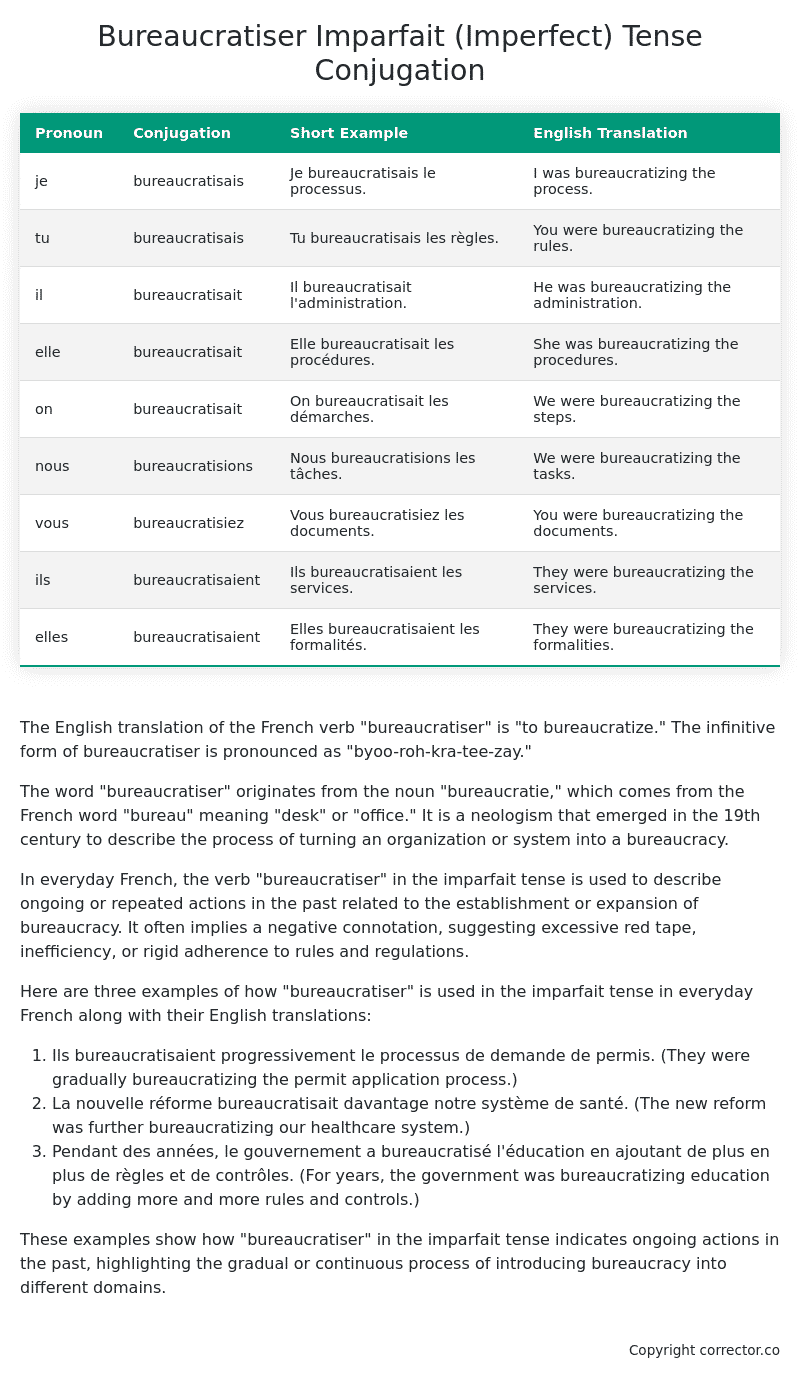Imparfait (Imperfect) Tense Conjugation of the French Verb bureaucratiser
Introduction to the verb bureaucratiser
The English translation of the French verb “bureaucratiser” is “to bureaucratize.” The infinitive form of bureaucratiser is pronounced as “byoo-roh-kra-tee-zay.”
The word “bureaucratiser” originates from the noun “bureaucratie,” which comes from the French word “bureau” meaning “desk” or “office.” It is a neologism that emerged in the 19th century to describe the process of turning an organization or system into a bureaucracy.
In everyday French, the verb “bureaucratiser” in the imparfait tense is used to describe ongoing or repeated actions in the past related to the establishment or expansion of bureaucracy. It often implies a negative connotation, suggesting excessive red tape, inefficiency, or rigid adherence to rules and regulations.
Here are three examples of how “bureaucratiser” is used in the imparfait tense in everyday French along with their English translations:
- Ils bureaucratisaient progressivement le processus de demande de permis.
(They were gradually bureaucratizing the permit application process.) - La nouvelle réforme bureaucratisait davantage notre système de santé.
(The new reform was further bureaucratizing our healthcare system.) - Pendant des années, le gouvernement a bureaucratisé l’éducation en ajoutant de plus en plus de règles et de contrôles.
(For years, the government was bureaucratizing education by adding more and more rules and controls.)
These examples show how “bureaucratiser” in the imparfait tense indicates ongoing actions in the past, highlighting the gradual or continuous process of introducing bureaucracy into different domains.
Table of the Imparfait (Imperfect) Tense Conjugation of bureaucratiser
| Pronoun | Conjugation | Short Example | English Translation |
|---|---|---|---|
| je | bureaucratisais | Je bureaucratisais le processus. | I was bureaucratizing the process. |
| tu | bureaucratisais | Tu bureaucratisais les règles. | You were bureaucratizing the rules. |
| il | bureaucratisait | Il bureaucratisait l’administration. | He was bureaucratizing the administration. |
| elle | bureaucratisait | Elle bureaucratisait les procédures. | She was bureaucratizing the procedures. |
| on | bureaucratisait | On bureaucratisait les démarches. | We were bureaucratizing the steps. |
| nous | bureaucratisions | Nous bureaucratisions les tâches. | We were bureaucratizing the tasks. |
| vous | bureaucratisiez | Vous bureaucratisiez les documents. | You were bureaucratizing the documents. |
| ils | bureaucratisaient | Ils bureaucratisaient les services. | They were bureaucratizing the services. |
| elles | bureaucratisaient | Elles bureaucratisaient les formalités. | They were bureaucratizing the formalities. |
Other Conjugations for Bureaucratiser.
Le Present (Present Tense) Conjugation of the French Verb bureaucratiser
Imparfait (Imperfect) Tense Conjugation of the French Verb bureaucratiser (You’re reading it right now!)
Passé Simple (Simple Past) Tense Conjugation of the French Verb bureaucratiser
Passé Composé (Present Perfect) Tense Conjugation of the French Verb bureaucratiser
Futur Simple (Simple Future) Tense Conjugation of the French Verb bureaucratiser
Futur Proche (Near Future) Tense Conjugation of the French Verb bureaucratiser
Plus-que-parfait (Pluperfect) Tense Conjugation of the French Verb bureaucratiser
Passé Antérieur (Past Anterior) Tense Conjugation of the French Verb bureaucratiser
Futur Antérieur (Future Anterior) Tense Conjugation of the French Verb bureaucratiser
Subjonctif Présent (Subjunctive Present) Tense Conjugation of the French Verb bureaucratiser
Subjonctif Passé (Subjunctive Past) Tense Conjugation of the French Verb bureaucratiser
Subjonctif Imparfait (Subjunctive Imperfect) Tense Conjugation of the French Verb bureaucratiser
Conditionnel Présent (Conditional Present) Tense Conjugation of the French Verb bureaucratiser
Conditionnel Passé (Conditional Past) Tense Conjugation of the French Verb bureaucratiser
Conditionnel Passé II (Conditional Past II) Tense Conjugation of the French Verb bureaucratiser
L’impératif Présent (Imperative Present) Tense Conjugation of the French Verb bureaucratiser
L’impératif Passé (Imperative Past) Tense Conjugation of the French Verb bureaucratiser
L’infinitif Présent (Infinitive Present) Tense Conjugation of the French Verb bureaucratiser
L’infinitif Passé (Infinitive Past) Tense Conjugation of the French Verb bureaucratiser
Le Participe Présent (Present Participle) Tense Conjugation of the French Verb bureaucratiser
Le Participe Passé (Past Participle) Tense Conjugation of the French Verb bureaucratiser
Struggling with French verbs or the language in general? Why not use our free French Grammar Checker – no registration required!
Get a FREE Download Study Sheet of this Conjugation 🔥
Simply right click the image below, click “save image” and get your free reference for the bureaucratiser imparfait tense conjugation!

Bureaucratiser – About the French Imparfait Tense
NOTE: To take a deep dive into all the French tenses then see our article on Mastering French Tense Conjugation.
Formation of the Imparfait Tense
For regular -er verbs:
For regular -ir verbs
For regular -re verbs
Common Everyday Usage Patterns
Description of Past Habits
Background Information
Mental and Emotional States
It’s employed to express emotions, thoughts, or physical sensations in the past. For example: “J’étais content quand il est arrivé.” (I was happy when he arrived.)
Ongoing Actions
Points to Note About the Imparfait Tense
Passé Composé vs. Imparfait
Conditional
Si Clauses
Narration
I hope you enjoyed this article on the verb bureaucratiser. Still in a learning mood? Check out another TOTALLY random French verb imparfait conjugation!


